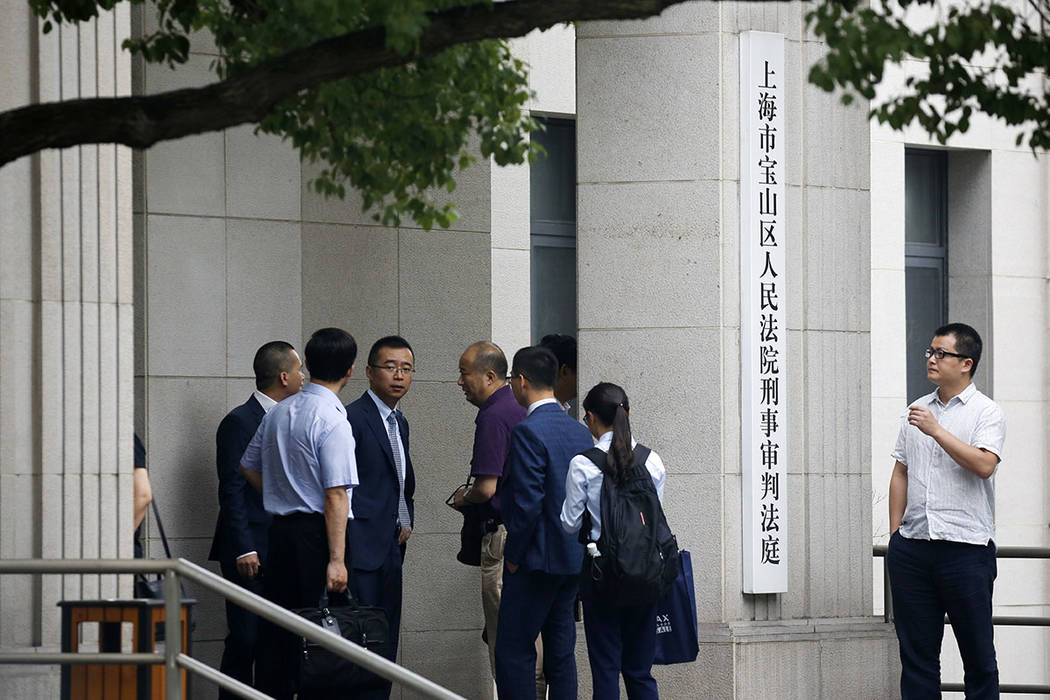China’s sentences casino workers in gambling case sends clear signal
China just sent a clear message to casinos sprouting across Asia: don’t peddle your baccarat here.
A Shanghai court on Monday convicted 19 Crown Resorts Ltd. current and former staff of illegally promoting gambling on the mainland, handing out prison sentences of as long as 10 months. While they could have faced a maximum of three years under Chinese law, there was no escaping China’s warning to foreign casino operators who see the country’s richest citizens as their most lucrative target market.
The crackdown on Australia’s largest listed operator was China’s broadest enforcement of a law that bars the promotion of gambling on the mainland as authorities seek to halt hundreds of billions of dollars of currency outflows. The convictions coincide with a planned new wave of Asian casinos, from Japan to Australia, that are poised to make a fresh push to attract business from China.
“That makes it a lot more important that they make it clear what the rules are,” said Colin Hawes, associate professor at the law faculty of the University of Technology Sydney who specializes in Chinese corporate law. “It’s more like a warning that they can’t be engaging in that kind of activity on the Chinese mainland.”
After a trial that lasted less than three hours, Jason O’Connor, Crown’s head of international high-roller operations, was among those who were jailed for 10 months. Four others received the same term while 11 were sentenced to nine months in prison. The sentencing period starts from October when they were detained.
Bo Bernhard, executive director of UNLV’s International Gaming Institute, who called the incident “a fascinating global moment,” said it’s too early to tell how it will impact future operations in Macau.
“Obviously, a lot of people were wondering what the endgame or outcome for the central government crackdown on the way in which Chinese gamblers were gambling and being marketed to,” Bernhard said. “Clearly, this is one answer.”
He said operators will be looking for answers in the days ahead.
“How this would impact future operations in Macau is the question,” he said. “How can you read the tea leaves here to try to ascertain what this means for the future of Macau? It seems like Macau has seen a rebound and we’ve reached a point of greater understanding of what the new normal is in Macau.
“The big question is whether this is one of the final chapters as it moves into a new normal where there’s a new understanding between Beijing, the Macau government, operators, Macau regulators as to how operations will proceed from here on out,” Bernhard said.
Gambling ban
China banned gambling when the Communist Party took over in 1949 on moral grounds, according to state media. Macau, the world’s largest gaming center, is the only Chinese territory where casinos are allowed to operate. Regulation there is tightening, making it an easier pitch for overseas operators — and the middlemen who lend money — to woo Chinese gamblers to other Asian gaming hubs.
More than one third of the revenue at Crown’s Melbourne and Perth resorts last fiscal year came from international visitors, predominantly from mainland China, according to Crown’s latest annual report.
In Japan, where lawmakers legalized casinos last December, Las Vegas Sands Corp. and MGM Resorts International are among those vying for a slice of that potential $25 billion market. A hot tourism destination for Chinese, Japan is following the lead of other Asian governments that are endorsing legal gambling in the region that’s embracing games of chance.
Crown, whose largest shareholder is billionaire James Packer, is itself developing a new A$2 billion ($1.5 billion) luxury resort on Sydney’s waterfront that will focus solely on high-stakes gamblers.
No gambling promotion
Foreign casino operators are allowed to promote their hotels and restaurants on the Chinese mainland but not their gaming facilities. China’s renewed clampdown on any overseas company that breaks this law makes it harder for gaming companies that have little else to peddle in China but poker or baccarat tables.
“Compared with Macau’s casino resorts, other casino properties in the region have less non-gaming elements that they can legally market in China,” said Richard Huang, an analyst at Nomura Holdings Inc. in Hong Kong. “Their marketing campaign in China would be more challenging in both gaining brand reputation and complying with laws.”
Other operators are also now expanding gaming to online and phone betting, with an eye to attracting Chinese players. Philippines and Vietnam now allow phone betting that’s banned in Macau, and provide favorable tax structures and policies for gaming. Philippine casinos reported as much as 110 percent increases in gaming revenue from high-stakes players, the majority of whom are from China — from $27 billion in bets placed last year.
The gambling operations are causing concern in China, where authorities have sought to halt billions of dollars worth of outflows that have pushed down the value of the currency and drained capital reserves — some of which exit the mainland through overseas gaming. Philippine authorities in late April arrested 55 Chinese nationals wanted in Beijing for alleged involvement in an online gambling syndicate north of Manila.
Review-Journal writer Richard N. Velotta contributed to this report. The Review-Journal is owned by the family of Las Vegas Sands Corp. Chairman and CEO Sheldon Adelson.































